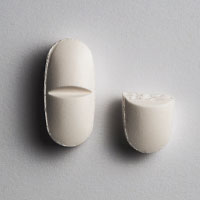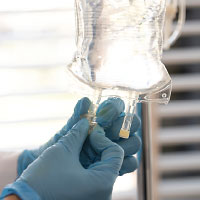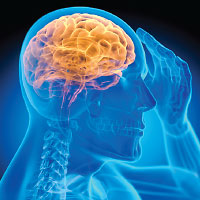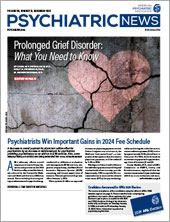TD Medications Associated With Improvements in Social, Physical Well-Being
People who experience involuntary movements characteristic of tardive dyskinesia (for example, lip smacking and grimacing) often report that there is a physical and social impact of the disorder. A
report now suggests that patients who experience a reduction of symptoms of tardive dyskinesia (TD) when taking a VMAT2 inhibitor may also experience improvements in social and physical well-being. The findings were published in
Mental Health Clinician.
Researchers at the University of California, San Diego, and colleagues analyzed the responses of 163 clinicians (the majority of whom were physicians) who completed an online survey. All those surveyed had prescribed at least one VMAT2 inhibitor within the previous 24 months. The respondents were asked to report the outcomes of up to 10 patients, using health records and their own recall.
The respondents provided data for a total of 601 patients 18 years and older who had taken a VMAT2 inhibitor (69% took valbenazine) for at least two months. The clinicians reported that since the patients began taking the VMAT2 inhibitor, 540 (90%) showed improvements in motor symptoms.
Prior to initiating TD treatment, the clinicians reported that 93% of patients experienced at least one social impairment (such as inability to work, attend school, or socialize), while 88% reported at least one physical impairment (such as inability to drive or speak clearly). After treatment, patients whom clinicians reported as having improved TD symptoms were also reported to have improvements in social and physical skills. Among patients classified as “much improved” for TD, for example, 98% reported improvement in at least one social domain, while 97% reported improvement in at least one physical domain. Socializing, engaging with family and friends, eating, and speaking were among the domains reported as most improved.
Further, about 70% of the patients who responded to TD medication also showed improvements in their primary psychiatric condition, the researchers noted. “[A] holistic approach to treating patients with TD that includes assessment of social and physical functioning is warranted,” the researchers wrote.
Prenatal Infection Not Linked With Broad Brain Morphology Changes in Offspring
Numerous animal studies have found evidence that prenatal infection can impact multiple brain regions in offspring. A
report in
Translational Psychiatry that analyzed data on mild infections experienced by women during pregnancy and the brains of their offspring suggests the impacts of such infections on the human brain may be more limited.
“[W]e only observed an association between prenatal infections and the caudal anterior cingulate volume,” wrote researchers from Erasmus MC University Medical Center and colleagues. “We did not observe effects of prenatal infection on other measures of adolescent brain morphology, white matter microstructure, or functional connectivity, which is reassuring.”
The findings were based on an analysis of data available in the Generation R Study, a large prospective cohort investigating maternal and child health. As part of the Generation R Study, women who were pregnant completed questionnaires during each trimester of their pregnancy; the questionnaires included questions about such infections as upper and lower respiratory infections, eye infections, and more. Based upon their response to this questionnaire, the women were assigned an “infection score” ranging from 0 to 30. The offspring of these women later received a series of brain scans between the ages of 13 and 16 to assess brain development.
The final sample included 1,094 mother-child pairs.
The investigators found a correlation between higher maternal infection scores and reduced volume in several brain regions of the children. However, after adjusting for such variables as maternal age, education, and alcohol/substance use, the only region affected by prenatal infection was the caudal anterior cingulate. This region is linked with executive functioning and emotional processing, and has been implicated in depression, anxiety, and psychosis.
“Considering the abundance of animal studies suggesting brain abnormalities [following prenatal infection], we believe it is important to highlight these findings in the human brain,” the investigators wrote.
Gradual Antipsychotic Tapering Increases Relapse Risk
Gradually tapering the dose of antipsychotics prescribed to adults with a nonaffective psychotic disorder does not appear to lead to benefits in social functioning, suggests a
report in
Lancet Psychiatry. However, gradual tapering does appear to increase the risk of relapse compared with maintaining antipsychotic dose.
“Our findings provide information for people with schizophrenia and related conditions about the probable medium-term impact of reducing the dose of their antipsychotic medication, and they highlight the need for collaborative decision-making based on the sharing and careful consideration of all the evidence,” wrote the study investigators from University College London and colleagues.
The RADAR trial was an open-label study involving 253 adults with a nonaffective psychotic disorder who were taking an antipsychotic. The participants were randomized to continue taking their medication (though they could make minor adjustments to dose to manage side effects) or undergo an individualized dose reduction plan; the goal was to incrementally reduce medication dosage every two months over 18 months. Participants could choose to discontinue completely or remain on a very low dose (equivalent to 2 mg haloperidol daily).
The participants were followed for 24 months and periodically assessed for social functioning, severe relapse requiring hospitalization, non-severe relapse, quality of life, antipsychotic side effects, and other measures.
After 24 months, there was no difference in social functioning levels between the maintenance and tapering groups, nor were there differences in most other clinical and social outcomes. However, 25% of individuals in the tapering group had at least one severe relapse by 24 months, compared with 13% of individuals in the maintenance group. The rate of non-severe relapse was also higher in the tapering group versus the maintenance group (41% vs. 22%, respectively).
Expectancy Bias May Contribute to Ketamine’s Antidepressant Effects
Ketamine administered while an individual is under anesthesia may be no more effective than placebo at reducing depressive symptoms, according to
research in
Nature Mental Health.
“In most randomized, controlled trials of ketamine for depression, participant masking has been nearly impossible given the drug’s obvious acute psychological effects,” wrote researchers from Stanford University and colleagues.
To determine if expectancy bias may be resulting in an overestimate of the treatment effects of ketamine, the researchers recruited 40 adults with treatment-resistant depression who were already scheduled for routine surgery for the study. During anesthesia, the participants were given a dose of intravenous ketamine (0.5 mg/kg) or saline placebo, thus preventing anyone from experiencing ketamine’s dissociative symptoms.
The participants were evaluated using the Montgomery–Åsberg Depression Rating Scale (MADRS) before the trial started and again 1, 2, and 3 days after the surgery.
By one day after the infusion, MADRS scores had dropped by 46% and 48% in the ketamine and placebo groups, respectively. MADRS scores increased slightly on day two for both groups, and then remained stable until day 14.
Only 37% of the participants correctly guessed which treatment they received, indicating that many patients remained unaware of their treatment throughout the trial. However, the researchers found that participants with the strongest MADRS improvements were more likely to guess ketamine (regardless of truth), reflecting a belief that it is a strong antidepressant.
“To the extent that the treatment effect in the ketamine group is similar to that of other studies, our data raise the possibility that antidepressant effects of ketamine may be achieved in the absence of a typical ketamine-induced conscious dissociative experience,” the researchers wrote. “[T]hese data point to a major role for extra-pharmacological effects in the response to ketamine among patients with depression.”
Emotional Stress Linked With Faster Brain Aging
Emotional distress may accelerate brain aging, according to a
report in
The Journal of Neuropsychiatry and Clinical Neurosciences.
Researchers at the German Center for Neurodegenerative Diseases in Rostock/Greifswald used data from the Study of Health in Pomerania (SHIP), a longitudinal study exploring the interplay of health risk factors and subsequent disease over 10 years. At the 10-year follow-up assessment, some participants received MRI scans.
Based on participant responses to their baseline interviews, the researchers quantified a psychosocial stress score related to stressors from five different domains:
•
stress related to the living situation
•
stress related to the social situation
•
stress related to the occupational situation
•
stress related to danger experiences
•
stress related to emotions.
The researchers next calculated brain age scores for the participants by measuring the degree of brain atrophy present in the MRI scans, controlling for such variables as gender, education level, diabetes, problematic alcohol consumption, smoking, and hypertension.
The sample included a total of 991 participants. The researchers identified no association between total psychosocial stress and increased brain aging (higher than average brain atrophy for a given age), nor any associations for four of the five individual stress domains. However, they estimated that each additional stressor related to emotions increased the risk of accelerated brain aging by 21%.
“Exposure to a stressor itself may not necessarily be a risk factor, because the person’s reaction to that stressor may determine the extent to which the biological stress system is activated,” the researchers wrote. “Appraisal of a stressor and coping strategies can play an important role in the level of reactivity.”
Additional analysis revealed that the risk of brain aging due to emotional stress was elevated in people with generalized anxiety disorder or mania symptoms compared to those without. ■





